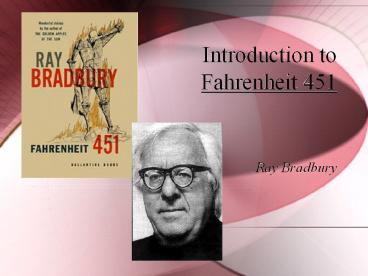Introduction to Fahrenheit 451 - PowerPoint PPT Presentation
Title:
Introduction to Fahrenheit 451
Description:
Title: DYSTOPIA: Author: Fedorko, Lauren Last modified by: Administrator Document presentation format: On-screen Show (4:3) Company: Tech Resources – PowerPoint PPT presentation
Number of Views:273
Avg rating:3.0/5.0
Title: Introduction to Fahrenheit 451
1
Introduction to Fahrenheit 451
- Ray Bradbury
2
DYSTOPIA
- The future through the eyes of fiction writers
3
What is a dystopia?
- Dys difficult, bad
- Topia place
- In practical terms, a dystopia is a vision of the
future that is bleak or dismal. It is also
usually a cautionary tale, a story that warns us
what could happen if certain trends continue.
4
Dystopian vs. Utopian Lit.
- Utopian literature describes an ideal imaginary
world. The term comes from Thomas Mores Latin
work Utopia, written in 1516. - Dystopian literature paints the opposite of the
ideal world, a place that is highly unpleasant.
5
What should be private and what should be public?
- One of the central questions of most dystopias is
how much power a government should have on its
citizens, and on what results when people in
power abuse it or when the government becomes too
powerful.
6
Some of the most famous dystopias
- 1984 - George Orwells grim vision of Big Brother
and ultimate government control. - Fahrenheit 451 - Ray Bradburys vision of a world
where books and ideas are dangerous, and firemen
burn books instead of putting out fires. - Brave New World - Aldous Huxleys vision of a
world where genetics are manipulated and all
people stay within their own class. The
government is your parent! - A Clockwork Orange - Stanley Kubricks film about
the ultimate acceptance of violence in a society. - The Island - a film where clones are farmed as
spare parts for - real citizens.
- V for Vendetta - a film where the government has
suppressed all dissent and controls all aspects
of peoples lives.
7
Common elements
- Over-controlling government
- A specific group that is outcast or oppressed
- At least one individual who questions the system
- An eventual attempt to revolt or overthrow the
government
8
What happens when government has no checks and
balances? When one person has all the power?
When rights are taken away for the purpose of
serving the greater good ?
9
Historical Context
- Written in the 1950s
- World War II (1939-1945) had just ended the US
had dropped the first atomic bombs on the
Japanese cities of Hiroshima and Nagasaki - Bradbury was influenced by the book burnings of
the Nazi regime in Germany during the 1930s - Political repression and dictatorship in Soviet
Union and fascist Spain even after World War II
when books were banned and intellectuals
persecuted.
10
- By 1949, communism had spread to Eastern Europe
and China - After World War II, Europe US versus Soviet
Union in COLD WAR. The threat of nuclear war
increased. - By mid-1950s, nearly 60 of Americans were
members of the middle class - More to buy.
- Consumerism Success
11
- The electronics industry became the 5th largest
industry. Television had a widespread impact in
American homes - The US became an automobile culture in the
1950s. - The increase in prosperity after the war led to
an increased passivity and conformity. Jobs were
plentiful and the common adage of the time period
was follow orders, you will succeed. (ie.
Montag at beginning).
12
- Published during McCarthyism era
- Sen. Joseph McCarthys hearings which
investigated spread of communism through
government infiltrators led to an atmosphere of
fear and distrust in the US. - In the early years of filmmaking, censorship was
allowed on the grounds that movies were
entertainment and not an expression of free
speech. - Sen. McCarthys hearings into the political
background of artists led to the blackballing
of several prominent Hollywood writers during the
1950s
13
- In an essay in 1953, Bradbury commented
- Some nights, when the wind is right, the future
smells of kerosene.
14
- In 1979, Bradbury discovered that his editors
had censored language in 75 separate sections of
Fahrenheit 451 without his knowledge or consent. - Students, reading the novel which, after all,
deals with censorship and book-burning in the
future, wrote to tell me of this exquisite irony.
15
Now that youve seen Future Fright, write a
150-word paragraph response to the movie.
Discuss any thoughts or feelings it brings up,
and also consider how it may relate to any
current events that you are aware of.































